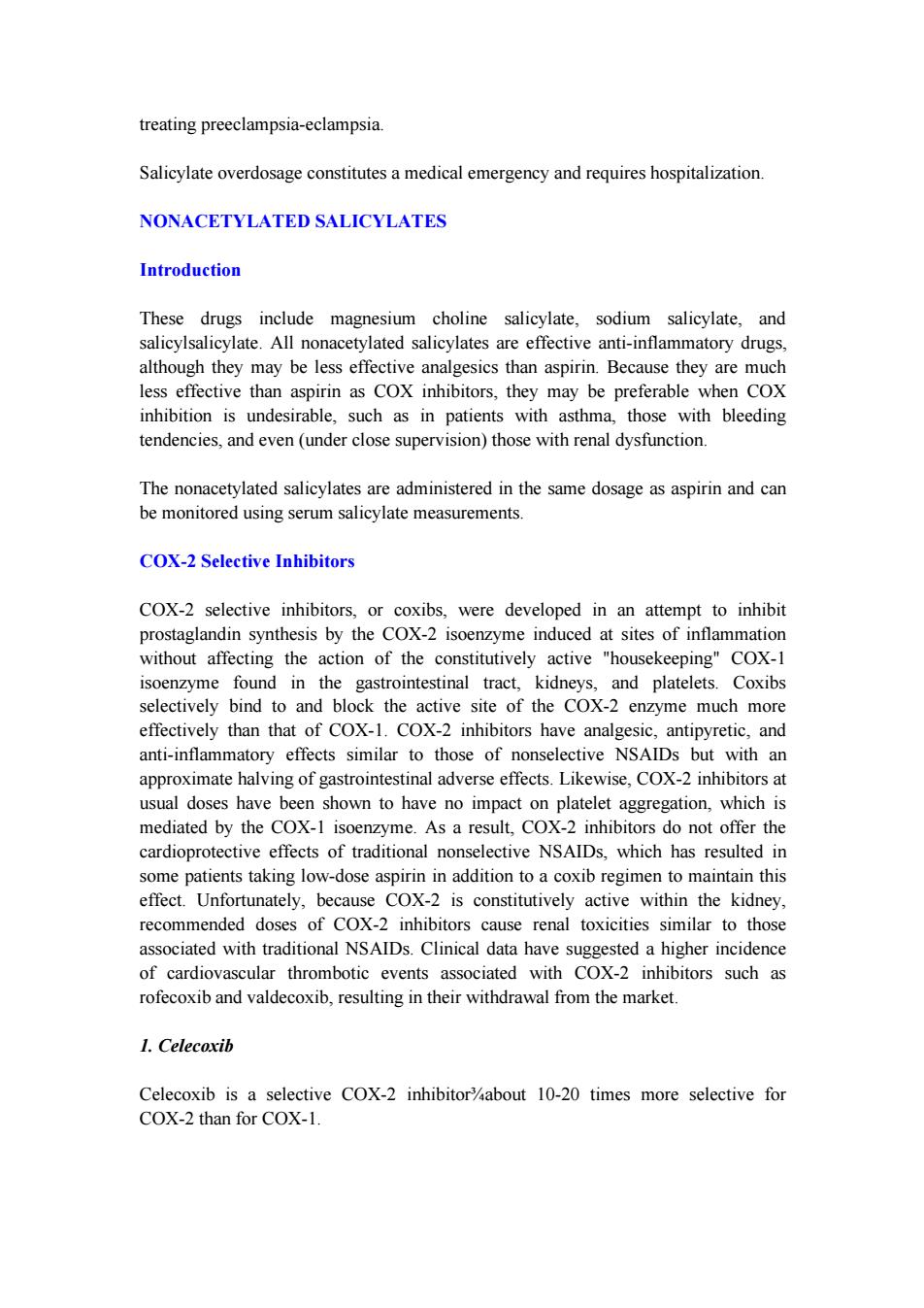正在加载图片...

treating preeclampsia-eclampsia Salicylate overdosage constitutes a medical emergency and requires hospitalization. NONACETYLATED SALICYLATES Introduction These drugs include magnesium choline salicylate,sodium salicylate,and salicylsalicylate.All nonacetylated salicylates are effective anti-inflammatory drugs, although they may be less effective analgesics than aspirin.Because they are much less effective than aspirin as COX inhibitors,they may be preferable when COX inhibition is undesirable,such as in patients with asthma,those with bleeding tendencies,and even (under close supervision)those with renal dysfunction. The nonacetylated salicylates are administered in the same dosage as aspirin and can be monitored using serum salicylate measurements. COX-2 Selective Inhibitors COX-2 selective inhibitors,or coxibs,were developed in an attempt to inhibit prostaglandin synthesis by the COX-2 isoenzyme induced at sites of inflammation without affecting the action of the constitutively active "housekeeping"COX-1 isoenzyme found in the gastrointestinal tract,kidneys,and platelets.Coxibs selectively bind to and block the active site of the COX-2 enzyme much more effectively than that of COX-1.COX-2 inhibitors have analgesic,antipyretic,and anti-inflammatory effects similar to those of nonselective NSAIDs but with an approximate halving of gastrointestinal adverse effects.Likewise,COX-2 inhibitors at usual doses have been shown to have no impact on platelet aggregation,which is mediated by the COX-1 isoenzyme.As a result,COX-2 inhibitors do not offer the cardioprotective effects of traditional nonselective NSAIDs,which has resulted in some patients taking low-dose aspirin in addition to a coxib regimen to maintain this effect.Unfortunately,because COX-2 is constitutively active within the kidney, recommended doses of COX-2 inhibitors cause renal toxicities similar to those associated with traditional NSAIDs.Clinical data have suggested a higher incidence of cardiovascular thrombotic events associated with COX-2 inhibitors such as rofecoxib and valdecoxib,resulting in their withdrawal from the market. 1.Celecoxib Celecoxib is a selective COX-2 inhibitorabout 10-20 times more selective for COX-2 than for COX-1.treating preeclampsia-eclampsia. Salicylate overdosage constitutes a medical emergency and requires hospitalization. NONACETYLATED SALICYLATES Introduction These drugs include magnesium choline salicylate, sodium salicylate, and salicylsalicylate. All nonacetylated salicylates are effective anti-inflammatory drugs, although they may be less effective analgesics than aspirin. Because they are much less effective than aspirin as COX inhibitors, they may be preferable when COX inhibition is undesirable, such as in patients with asthma, those with bleeding tendencies, and even (under close supervision) those with renal dysfunction. The nonacetylated salicylates are administered in the same dosage as aspirin and can be monitored using serum salicylate measurements. COX-2 Selective Inhibitors COX-2 selective inhibitors, or coxibs, were developed in an attempt to inhibit prostaglandin synthesis by the COX-2 isoenzyme induced at sites of inflammation without affecting the action of the constitutively active "housekeeping" COX-1 isoenzyme found in the gastrointestinal tract, kidneys, and platelets. Coxibs selectively bind to and block the active site of the COX-2 enzyme much more effectively than that of COX-1. COX-2 inhibitors have analgesic, antipyretic, and anti-inflammatory effects similar to those of nonselective NSAIDs but with an approximate halving of gastrointestinal adverse effects. Likewise, COX-2 inhibitors at usual doses have been shown to have no impact on platelet aggregation, which is mediated by the COX-1 isoenzyme. As a result, COX-2 inhibitors do not offer the cardioprotective effects of traditional nonselective NSAIDs, which has resulted in some patients taking low-dose aspirin in addition to a coxib regimen to maintain this effect. Unfortunately, because COX-2 is constitutively active within the kidney, recommended doses of COX-2 inhibitors cause renal toxicities similar to those associated with traditional NSAIDs. Clinical data have suggested a higher incidence of cardiovascular thrombotic events associated with COX-2 inhibitors such as rofecoxib and valdecoxib, resulting in their withdrawal from the market. 1. Celecoxib Celecoxib is a selective COX-2 inhibitor¾about 10-20 times more selective for COX-2 than for COX-1